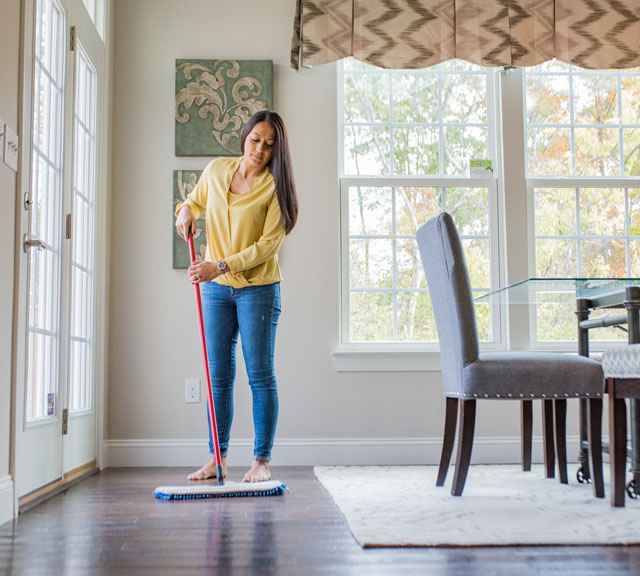When Unwanted Thoughts Won't Go Away: Obsessive-Compulsive Disorder

Find Your Perfect Match
Answer a few questions and we'll provide you with a list of primary care providers that best fit your needs.
We're all occasionally bothered by worries, both big ones (Will my children grow up to be happy?) and not-so-big ones (Did I turn the TV off before I left the house?). And most of us are vulnerable to compulsions of one kind or another. They can lead us, for instance, to eat things that we know aren't good for us or to spend too much time binge-watching our favorite shows.
People with obsessive-compulsive disorder (OCD) have their share of those garden-variety anxieties and urges, but they also deal with obsessions (repeated, unwelcome thoughts or mental images) and compulsions (the urge to perform repetitive behaviors) of a different, more troubling sort. They are typically plagued by continual, intrusive thoughts and fears. Their compulsions can lead to irrational or ritualistic actions, meant to ease the anxiety, that take up an excessive amount of time and diminish their quality of life.
For example, someone with OCD might worry continually about coming into contact with germs and, for that reason, wash their hands dozens of times every day. Or they might feel compelled to check and recheck to make sure their home's doors and windows are locked and the oven is off. Often, people with OCD are very concerned with order and symmetry, which can lead them to spend time arranging and rearranging objects around them into patterns that satisfy their compulsion. Because of the time devoted to these behaviors and the stress of coping with the condition, many people with OCD have trouble accomplishing necessary daily tasks at work and at home.
Most often, the person with OCD realizes that their obsessive-compulsive thoughts and behaviors don't make sense, but they feel powerless to stop them.
OCD is a common condition, affecting people of all ages and races all around the world. Some 2 percent of the people in the U.S. (one person in 40) will be diagnosed with OCD in their lives, according to the National Alliance on Mental Illness.
If you're living with the anxiety and unhappiness of OCD, take heart. Treatments that can help ease your symptoms and take away some of your stress are available.
What Causes OCD?
The causes of OCD are not completely understood, but there are certain known risk factors.
Genetics plays a part. Studies show that people who have first-degree relatives (a parent, sibling, or child) with OCD stand a higher chance of developing OCD themselves.
It's possible, too, that physical aspects of the brain may be involved. Research is ongoing, but there are indications of a connection between OCD symptoms and abnormalities in certain parts of the brain.
Environmental factors can also play a part. People who have been abused, physically or sexually, in childhood are at increased risk for developing OCD.
Other Symptoms of OCD
People experience OCD in different ways, and the symptoms are not always the same. In addition to those we've already talked about, symptoms of OCD can include:
- Intrusive thoughts about the possibility of harming yourself or others
- Unwanted, "forbidden" and disturbing thoughts involving sex or religion
- Compulsive counting or touching things
- The need to do tasks in a certain order
- Fear of throwing away something that might be useful later, which may lead to hoarding
When Does Worry Become OCD?

A doctor or mental health professional can make a diagnosis of OCD after a physical and psychological exam. They will rule out other possible causes, such as illegal drug use or another mental or physical condition. To be diagnosed with OCD, the person's obsessions and compulsions must:
- Take up at least an hour every day
- Cause difficulties at work or at home, interfering with daily life
- Cause the patient distress
How Is OCD Treated?
If you're living with the anxiety and unhappiness of OCD, take heart. Treatments that can help ease your symptoms and take away some of your stress are available. Before prescribing a course of treatment, your health care provider will take into account variables such as your age and overall health, the severity of your disorder and your own preferences among the treatment options available. Treatments for OCD can include medication, psychotherapy, or a combination of the two.
Medications that treat anxiety or depression are often used to treat OCD patients.
Psychotherapy can include cognitive behavior therapy (CBT), which teaches patients to think and behave differently in reaction to obsessions and compulsions. Exposure and Response Prevention therapy (EX/RP)—gradually exposing patients to their fears and helping them overcome their anxiety—is also used in the treatment of OCD.
Both medication and psychotherapy can take some time to work, so it's important not to give up on treatment too soon. Keep in mind that these approaches have helped many, many people take control of their OCD symptoms and live fuller, happier lives.
Find Your Perfect Match
Answer a few questions and we'll provide you with a list of primary care providers that best fit your needs.
Source: National Institute of Mental Health; National Alliance on Mental Illness



.tmb-card-head.webp?sfvrsn=680c0961_8)
